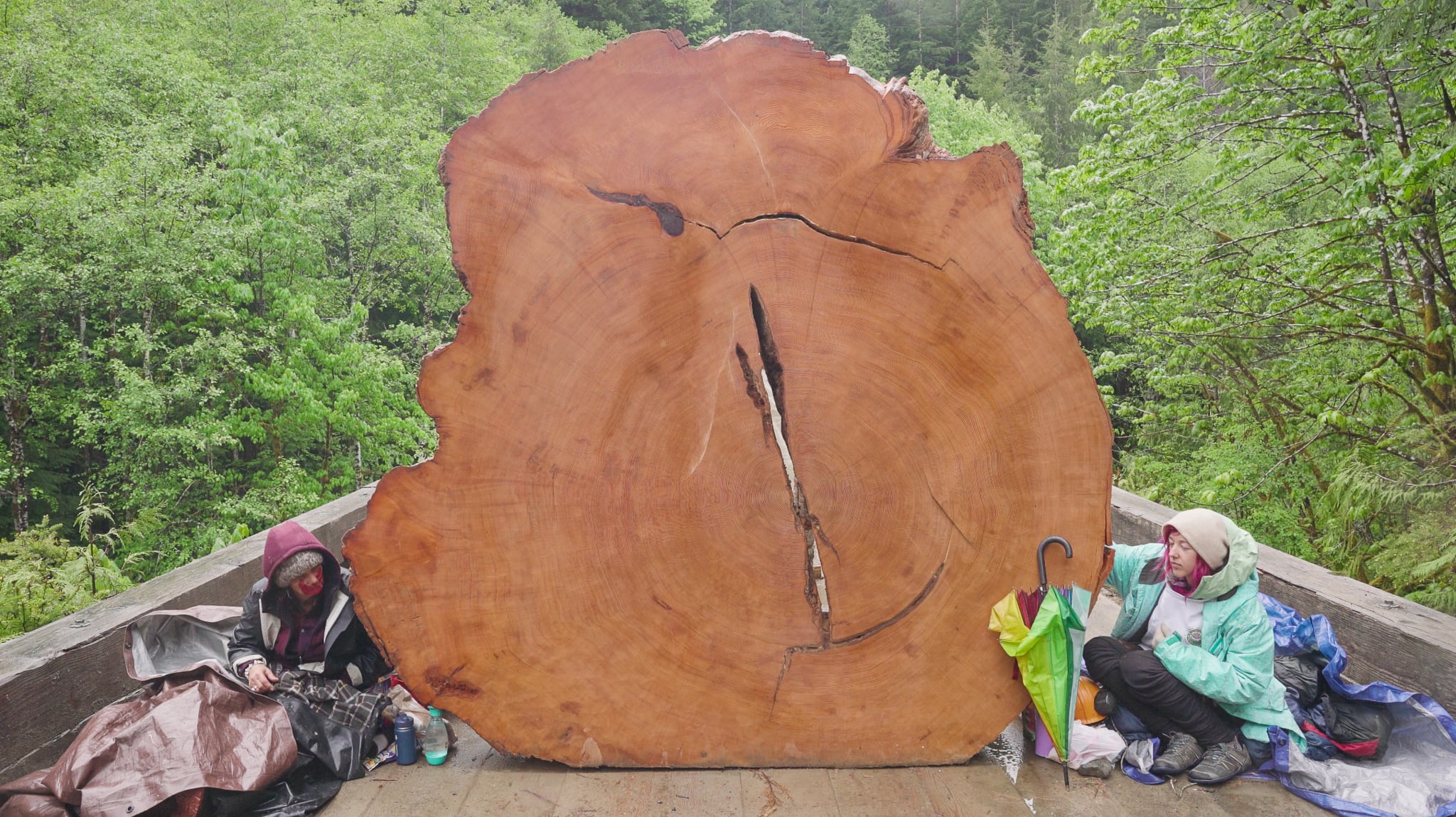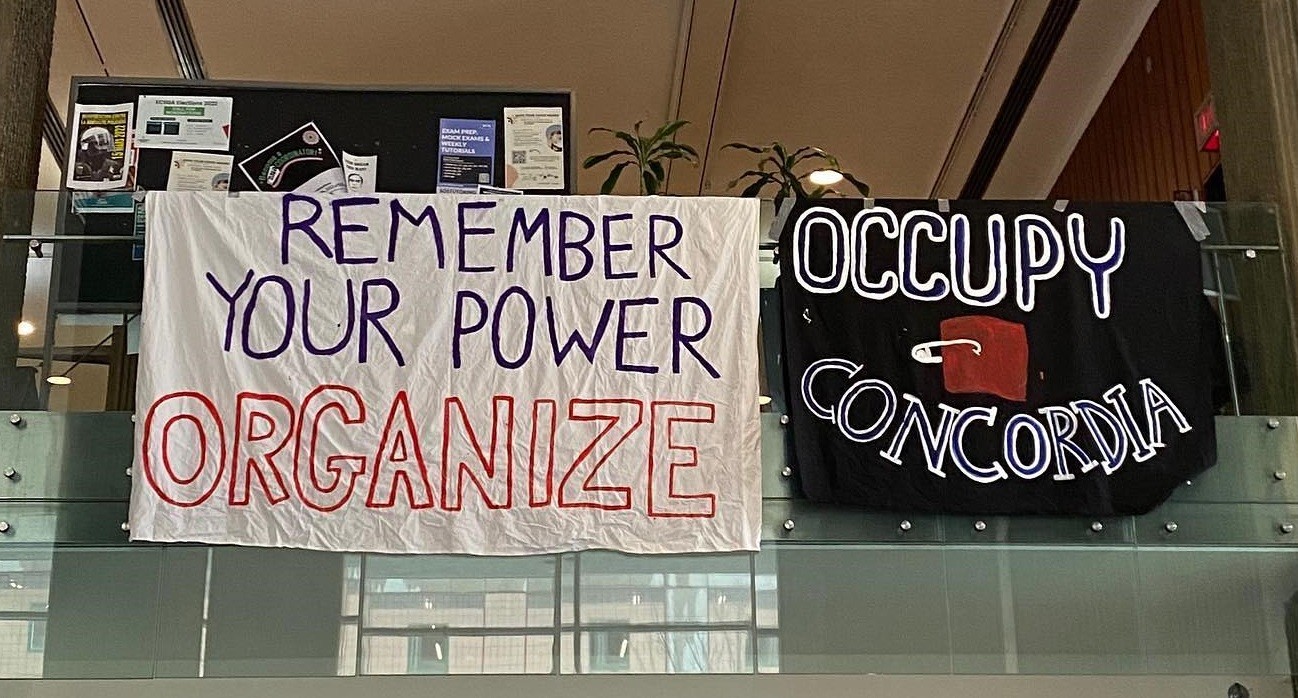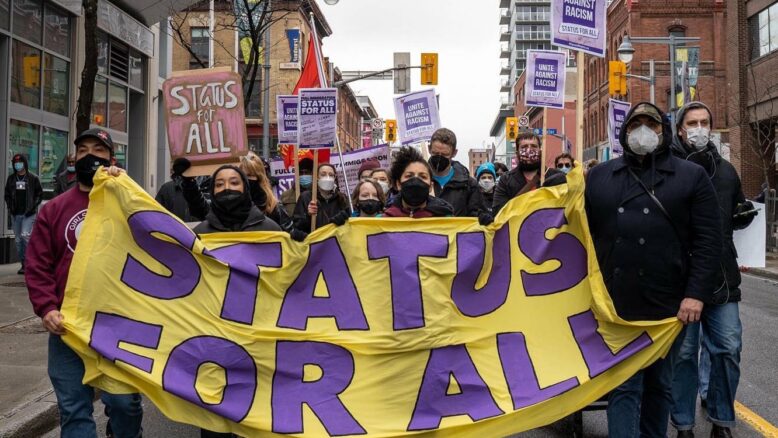From Canadian Tire Fire
This week we look at a student organizing in Alberta, Quebec, and Ontario, a labour action in Subdury, a housing justice rally in Toronto, and migrant rights actions across the country.
Settler colonial violence continues from one end of the country to another, while Indigenous nations and supporters resist. On the west coast, Gidimt’en checkpoint continues to receive near daily visits from RCMP. Just last week, cops cut chains to break through gates into the camp.
Meanwhile, a date has been set for an Ontario Superior Court hearing to determine whether developer Foxgate will be granted another injunction against 1492 Land Back Lane.
This week also marked the beginning of a 10-day pre-trial hearing for four animal rights activists charged with break and enter and mischief for filming animal cruelty at the Excelsior Hog Farm in Abbotsford, BC. On the first day of the hearing, supporters rallied at the court house, holding up images of pigs from the farm.
In Montreal, anarchists organized a small demonstration to the Russian consulate in solidarity with war resisters in Ukraine, Russia, and Belarus. Banners were hung on the gates of the consulate, and the building was egged. An account on twitter concludes: “Solidarity with people resisting war and occupation, not with states, not with any fascists, and not with NATO.”
Finally, earlier this month, the Fairy Creek Blockade re-opened their calls for people to join them on the frontlines in the fight to defend old growth forest.
Occupations and Student Strikes in Montreal, Toronto, and Alberta
After pausing for a few days due to a possible COVID outbreak, the student occupation at McGill University in Montreal has started up again.
But McGill wasn’t alone last week. For several days, an occupation of nearby anglophone Concordia University took place as well, though it is now over. A social media post from student group SEIZE Concordia explains some of the motivations for the action:
The Concordia hall building has been occupied! Among the demands of student organizers are for Concordia University to follow through on its promise to divest from fossil fuels, improve COVID-19 procedures for vulnerable students, citizenship and permanent residency status for international students who want it, and free tuition for all.
Last week also marked the 10 year anniversary of the massive March 22nd demonstration during the 2012 Quebec Student strikes. In Montreal, multiple events took place including daytime and nighttime demos, a walkout at McGill, and several day occupation at the Université du Québec à Montreal (UQAM).
Also at UQAM, the Association facultaire étudiante des sciences humaines de l’UQÀM (AFESH-UQÀM) held a week long strike demanding the remuneration of internships and an end to student precarity. Starting April 1st, another strike will begin, this one a Climate Strike.
In Ontario, students walked out on March 21st as part of a coordinated response to the provincial government’s gradual removal of public health measures, while COVID cases begin to tick up again. “We just want PCR testing, we want to be notified about the amount of cases that are in our schools for our own safety, and for our health to above our academics,” one grade 11 student told media. While we don’t think the path through the pandemic lies in government measures like mask mandates and vaccine passes, we think the students are correct in their assessment that the provincial government’s removal of the measures is driven by economic imperatives that put education over health. When the students grow frustrated with appeals to the provincial government, we hope they will take things into their own hands and organize with their peers to keep each other safe in schools.
In Alberta, drama students at the University of Calgary were on strike on March 28th calling for a reversal of $700 million of post-secondary funding cuts and a tuition freeze. This strike is the first student strike in the history of Alberta.
Sudbury Food Delivery Drivers Stage One-Day Strike
Almost 300 Skip The Dishes delivery drivers took collective action on Friday, March 18. The drivers stopped working to raise issues about fair compensation for their work. Workers said that Skip The Dishes has ignored them when they have raised issues about their rate of pay compared to the distances they are expected to travel for orders. They say that they are not paid enough to cover gas costs, especially with current prices. Other drivers have raised concerns about not receiving the money they are tipped through the app.
Skip the Dishes workers aren’t currently unionized – food delivery drivers are considered independent contractors, a designation that denies them many of the protections that other workers employed by large corporations benefit from. In 2020, delivery drivers with Foodora won a court case that would grant them the opportunity to unionize, shortly after which Foodora shut down their Canadian operation. Exploitation of workers appears to be a staple of the food delivery industry’s business model. However, Sudbury Skip the Dishes drivers have put the company on alert that they are willing to strike again as long as their mistreatment continues.
Stop Criminalizing Homelessness Rally in Toronto
Housing justice organizers in Toronto staged erected tents and rallied outside of city hall to demand an end to encampment bans on public property. Like many other cities, Toronto bylaws prevent people from “lodging” and erecting tents and other structures in public parks. The same day as the rally, Toronto City Councillors were meeting to discuss closing temporary shelters that had opened in the city as part of pandemic response.
Last summer, the City spent over $2 million evicting residents from City parks. With firsthand knowledge of the violence and force that the City is willing to use to enforce park bylaws, and an expectation that park encampments will only grow with shelter closures, activists are pushing hard for policy change.
Status for All Actions Across Canada
On March 21st, the international day for the elimination of racism, people across the country rallied for Status for All. Their campaign calls for all migrants, refugees, students, workers, and undocumented people to be given full and permanent immigration status. Migrant-led marches, rallies, and actions at politician’s offices took place in over 20 cities in Canada, including Ottawa, Niagara-on-the-Lake, Leamington, Sault-Ste-Marie,Quebec, Ottawa, Guelph, Edmonton, Calgary, St. John’s, Burnaby and Toronto. Actions in Canada were also coordinated with actions in other countries, including Jamaica, Trinidad, St. Vincent, and the Cayman Islands.
Without full immigration status, migrant workers, undocumented people and others with precarious immigration status lack the protections and services afforded to many others living in so-called Canada. Workers are forced into precarious jobs where they have few labour rights, and can face deportation for leaving an abusive employer. As the COVID-19 pandemic persists, those without status face great risks when accessing government services like health care. In a country built on stolen land, it is unacceptable for the state to regulate who is worthy of full “status.” However, even in the absence of any change in state policy, this day of action demonstrated the strength of solidarity between migrants and all those willing to gather and demand an end to racist immigration policies.
This week we look at a student organizing in Alberta, Quebec, and Ontario, a labour action in Subdury, a housing justice rally in Toronto, and migrant rights actions across the country.
Settler colonial violence continues from one end of the country to another, while Indigenous nations and supporters resist. On the west coast, Gidimt’en checkpoint continues to receive near daily visits from RCMP. Just last week, cops cut chains to break through gates into the camp.
Meanwhile, a date has been set for an Ontario Superior Court hearing to determine whether developer Foxgate will be granted another injunction against 1492 Land Back Lane.
This week also marked the beginning of a 10-day pre-trial hearing for four animal rights activists charged with break and enter and mischief for filming animal cruelty at the Excelsior Hog Farm in Abbotsford, BC. On the first day of the hearing, supporters rallied at the court house, holding up images of pigs from the farm.
In Montreal, anarchists organized a small demonstration to the Russian consulate in solidarity with war resisters in Ukraine, Russia, and Belarus. Banners were hung on the gates of the consulate, and the building was egged. An account on twitter concludes: “Solidarity with people resisting war and occupation, not with states, not with any fascists, and not with NATO.”
Finally, earlier this month, the Fairy Creek Blockade re-opened their calls for people to join them on the frontlines in the fight to defend old growth forest.

Occupations and Student Strikes in Montreal, Toronto, and Alberta
After pausing for a few days due to a possible COVID outbreak, the student occupation at McGill University in Montreal has started up again.
But McGill wasn’t alone last week. For several days, an occupation of nearby anglophone Concordia University took place as well, though it is now over. A social media post from student group SEIZE Concordia explains some of the motivations for the action:
The Concordia hall building has been occupied! Among the demands of student organizers are for Concordia University to follow through on its promise to divest from fossil fuels, improve COVID-19 procedures for vulnerable students, citizenship and permanent residency status for international students who want it, and free tuition for all.

Last week also marked the 10 year anniversary of the massive March 22nd demonstration during the 2012 Quebec Student strikes. In Montreal, multiple events took place including daytime and nighttime demos, a walkout at McGill, and several day occupation at the Université du Québec à Montreal (UQAM).
Also at UQAM, the Association facultaire étudiante des sciences humaines de l’UQÀM (AFESH-UQÀM) held a week long strike demanding the remuneration of internships and an end to student precarity. Starting April 1st, another strike will begin, this one a Climate Strike.
In Ontario, students walked out on March 21st as part of a coordinated response to the provincial government’s gradual removal of public health measures, while COVID cases begin to tick up again. “We just want PCR testing, we want to be notified about the amount of cases that are in our schools for our own safety, and for our health to above our academics,” one grade 11 student told media. While we don’t think the path through the pandemic lies in government measures like mask mandates and vaccine passes, we think the students are correct in their assessment that the provincial government’s removal of the measures is driven by economic imperatives that put education over health. When the students grow frustrated with appeals to the provincial government, we hope they will take things into their own hands and organize with their peers to keep each other safe in schools.
In Alberta, drama students at the University of Calgary were on strike on March 28th calling for a reversal of $700 million of post-secondary funding cuts and a tuition freeze. This strike is the first student strike in the history of Alberta.
Sudbury Food Delivery Drivers Stage One-Day Strike
Almost 300 Skip The Dishes delivery drivers took collective action on Friday, March 18. The drivers stopped working to raise issues about fair compensation for their work. Workers said that Skip The Dishes has ignored them when they have raised issues about their rate of pay compared to the distances they are expected to travel for orders. They say that they are not paid enough to cover gas costs, especially with current prices. Other drivers have raised concerns about not receiving the money they are tipped through the app.
Skip the Dishes workers aren’t currently unionized – food delivery drivers are considered independent contractors, a designation that denies them many of the protections that other workers employed by large corporations benefit from. In 2020, delivery drivers with Foodora won a court case that would grant them the opportunity to unionize, shortly after which Foodora shut down their Canadian operation. Exploitation of workers appears to be a staple of the food delivery industry’s business model. However, Sudbury Skip the Dishes drivers have put the company on alert that they are willing to strike again as long as their mistreatment continues.
Stop Criminalizing Homelessness Rally in Toronto
Housing justice organizers in Toronto staged erected tents and rallied outside of city hall to demand an end to encampment bans on public property. Like many other cities, Toronto bylaws prevent people from “lodging” and erecting tents and other structures in public parks. The same day as the rally, Toronto City Councillors were meeting to discuss closing temporary shelters that had opened in the city as part of pandemic response.
Last summer, the City spent over $2 million evicting residents from City parks. With firsthand knowledge of the violence and force that the City is willing to use to enforce park bylaws, and an expectation that park encampments will only grow with shelter closures, activists are pushing hard for policy change.
Status for All Actions Across Canada
On March 21st, the international day for the elimination of racism, people across the country rallied for Status for All. Their campaign calls for all migrants, refugees, students, workers, and undocumented people to be given full and permanent immigration status. Migrant-led marches, rallies, and actions at politician’s offices took place in over 20 cities in Canada, including Ottawa, Niagara-on-the-Lake, Leamington, Sault-Ste-Marie,Quebec, Ottawa, Guelph, Edmonton, Calgary, St. John’s, Burnaby and Toronto. Actions in Canada were also coordinated with actions in other countries, including Jamaica, Trinidad, St. Vincent, and the Cayman Islands.
Without full immigration status, migrant workers, undocumented people and others with precarious immigration status lack the protections and services afforded to many others living in so-called Canada. Workers are forced into precarious jobs where they have few labour rights, and can face deportation for leaving an abusive employer. As the COVID-19 pandemic persists, those without status face great risks when accessing government services like health care. In a country built on stolen land, it is unacceptable for the state to regulate who is worthy of full “status.” However, even in the absence of any change in state policy, this day of action demonstrated the strength of solidarity between migrants and all those willing to gather and demand an end to racist immigration policies.
Follow Canadian Tire Fire on Twitter.

